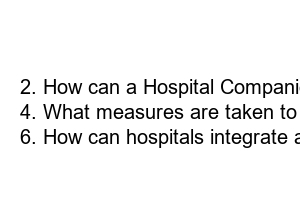병원동행매니저
Introducing the Hospital Companion Manager: Revolutionizing Patient Care
At the heart of every hospital lies the patient. Ensuring their comfort, well-being, and overall experience is a top priority for healthcare providers. That’s where the Hospital Companion Manager steps in. This innovative role has become an indispensable part of healthcare teams, delivering personalized care and support to patients throughout their hospital stay.
1. What is a Hospital Companion Manager and what do they do?
Hospital Companion Managers are highly trained professionals who work closely with patients, doctors, and nurses to provide comprehensive care. Their primary role is to act as a liaison between the hospital staff and the patient, ensuring open communication and addressing any concerns or needs that arise. From managing medication schedules to providing emotional support, Hospital Companion Managers are the ultimate patient advocates.
2. How does a Hospital Companion Manager enhance patient care?
By being a constant presence by the patient’s side, Hospital Companion Managers dramatically improve patient care. They assist with mobility, offering physical assistance and ensuring patients are comfortable and safe. They also provide companionship, engaging in conversation and recreational activities to combat feelings of loneliness and anxiety. Through their round-the-clock availability, they can promptly address any medical or non-medical needs, ensuring patients receive the attention they deserve.
3. What qualities should a Hospital Companion Manager possess?
Hospital Companion Managers must possess a diverse skill set to excel in their role. Compassion and empathy are key, as they form strong bonds with patients and offer emotional support. Strong communication skills are crucial for effectively relaying information between patients, families, and medical staff. Additionally, organizational skills help Hospital Companion Managers manage schedules, appointments, and daily tasks seamlessly.
4. How does the presence of a Hospital Companion Manager impact patient experience?
The presence of a Hospital Companion Manager can significantly improve the overall patient experience. Patients feel reassured, knowing there is someone dedicated to their well-being and ready to address their concerns. Loneliness and boredom – often experienced during hospital stays – are minimized as Hospital Companion Managers provide stimulating activities and meaningful interactions. This, in turn, can lead to faster recovery and increased patient satisfaction.
5. How does the role of a Hospital Companion Manager align with the hospital’s goals?
Hospitals aim to provide the highest quality of care and promote positive patient outcomes. The role of a Hospital Companion Manager aligns perfectly with these goals. By fostering a patient-centered approach, Hospital Companion Managers enhance care delivery, improve patient satisfaction, and create an environment conducive to healing.
6. What are the benefits of implementing a Hospital Companion Manager program?
Implementing a Hospital Companion Manager program has numerous benefits, both for the hospital and patients. Hospital Companion Managers contribute to better patient outcomes, shorter hospital stays, and reduced readmission rates. They also alleviate the burden on nursing staff, enabling nurses to focus on critical medical tasks. The program ultimately creates a more efficient and compassionate healthcare environment.
In summary, the Hospital Companion Manager is a game-changer in the world of patient care. With their expertise in communication, empathy, and organization, they provide invaluable support and companionship to patients. Their presence results in enhanced patient experience, improved outcomes, and a truly patient-centered healthcare approach. By incorporating the role of a Hospital Companion Manager into hospitals, we can revolutionize the way we care for patients.
FAQs:
1. What qualifications are required to become a Hospital Companion Manager?
2. How can a Hospital Companion Manager improve patient satisfaction?
3. Are Hospital Companion Managers available for both short-term and long-term patients?
4. What measures are taken to ensure patient privacy and confidentiality?
5. Can Hospital Companion Managers provide assistance to non-English speaking patients?
6. How can hospitals integrate a Hospital Companion Manager program into their existing structure?

